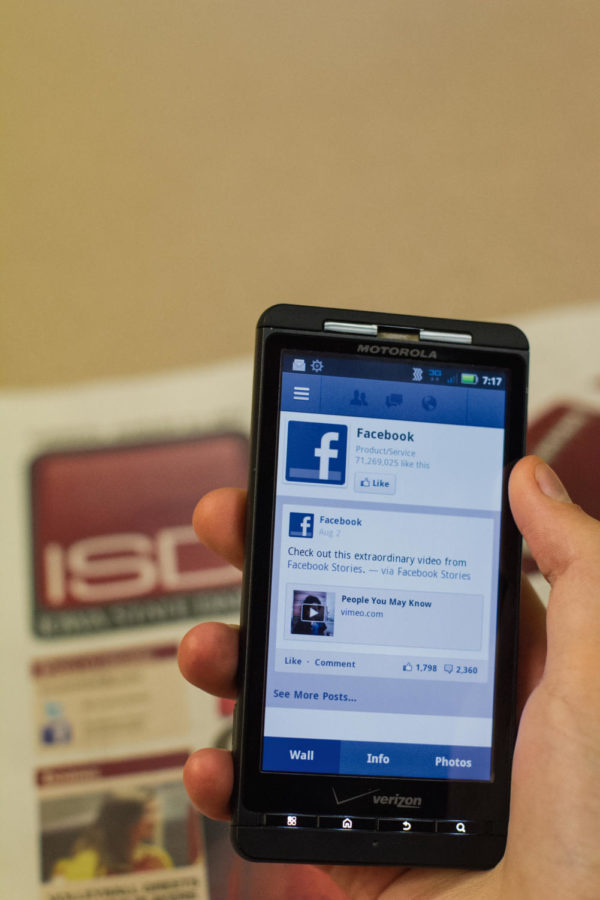McLaughlin: Social media isn’t the place for ridicule, judgement
With over 1.15 billion users on Facebook and over 500 million Twitter users, anybody walking down the street has a good chance of being active on a social network. Columnist Curran McLaughlin argues that social media are meant to be used as outlets, and people should not have to worry about keeping up appearances online.
February 27, 2014
The current population of the developed world has almost completely submerged into the use of social media. With over 1.15 billion users on Facebook and over 500 million Twitter users, anybody walking down the street has a good chance of being active on a social network. Social media is a place where people can keep constant contact with what matters most to them, whether that be friends, music or any other form of media. As the medium keeps growing, though, users find that they have to continually keep up with their profile to avoid conflict with possible employers, family members and peers.
The internet should not just be another place where people have to worry about their appearances, it should be place where people can simply be themselves and let go.
Perhaps a large portion of this problem is that the internet is not the same as being in public. A person typically is accessing their social media from their phone, tablet or through a computer when they have downtime. Surfing the internet, like a micro-blogging website, is typically an activity done alone.
When a person is on their Facebook or Twitter account, they do not interact with people the same way that they would with a person sitting right next to them. Since there are no personal interactions on the website, a person will act differently towards the general audience that they will reach.
Social media should not be a place for one to straighten out their life or to appeal to future employers. The point of social networking is for entertainment and interaction. It is a place where college students, high school students and young adults alike can go to blow off steam. Individuals can go online and talk about shows or events that they are watching, learn about developments with a favorite celebrity or musician or vent to the faceless web about problems or concerns that they might have about their own life.
Social media has become a defense mechanism. It has allowed us the ability to act on one’s own emotion in a social setting without the pressure of being present in a real life public setting. People want the ability to release emotions felt from the stress of living life and social media is a more acceptable alternative than having a nervous breakdown at the local grocery store.
Teens who are faced with suicidal thoughts or depression sometimes find their profile as a way to reach out for assistance. Social media is the second most common way for teens to seek for help and is even more common than calling a suicide hotline. Teenagers may feel more comfortable talking about there problems in a less personal setting because they will not feel as harshly judged through a computer screen.
Others use social media to reach to strangers and open up or discuss personal issues while escaping from complete judgment by their peers. For example, Katie Byrd, a 30-year-old pregnant woman living in Indianola, has taken to Twitter recently to cope with the frustration and challenges of living as a soon-to-be single mother working two jobs. On her profile, she often quotes the uncouth comments her friends, family, co-workers make and adds her own twist of sarcasm as way to channel her anger.
Many people also go to social media sites which allow anonymous accounts solely for that purpose. Without the fear of people discovering who they are, an upset teen or disgruntled employee can release their full range of emotions.
At Iowa State there are several examples of how students take advantage of internet anonymity to express feelings of admiration, guilt, or just simply to share an embarrassing or crazy story. Several Twitter accounts such as @CycloneCrushes and @MWLConfessions have gained popularity on the premise of college students sending anonymous message to the account to be shared with its followers.
For instance, Cyclones Crushes lets an anonymous student describes another that they have seen during their day that they wish to express their enamor or sometimes simply lust for. “Blonde with purple pants at the library yesterday, hey,” an unidentified admirer said earlier this month. These students might rely on these accounts because they are too scared to come out and talk to an attractive guy or girl.
Behind the safety of Cyclone Crush they can get what they want to say off their chest, possibly as a way to build up confidence to talk to them the next chance they have to see him or her.
Social media accounts are more than just a censored page of someone’s public image. They are a wonderful place for people to express their feelings yet retain a sense of seclusion from brutal peer judgment.

















